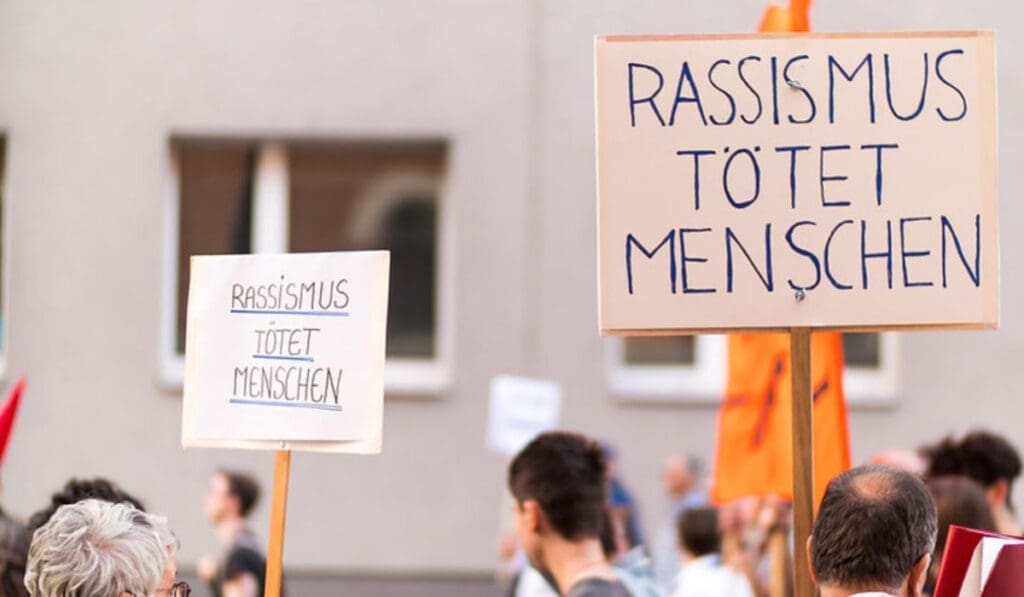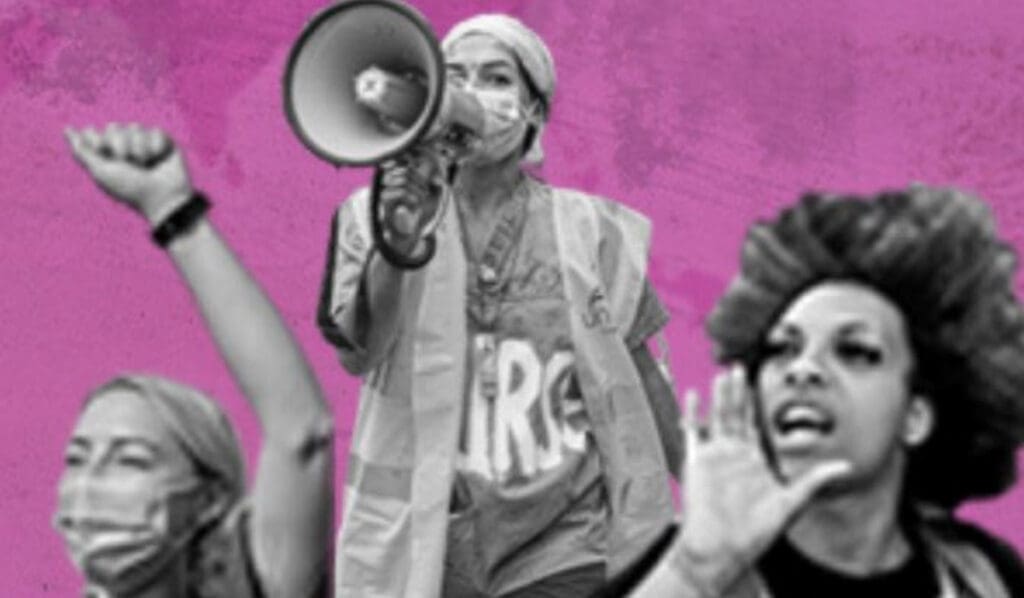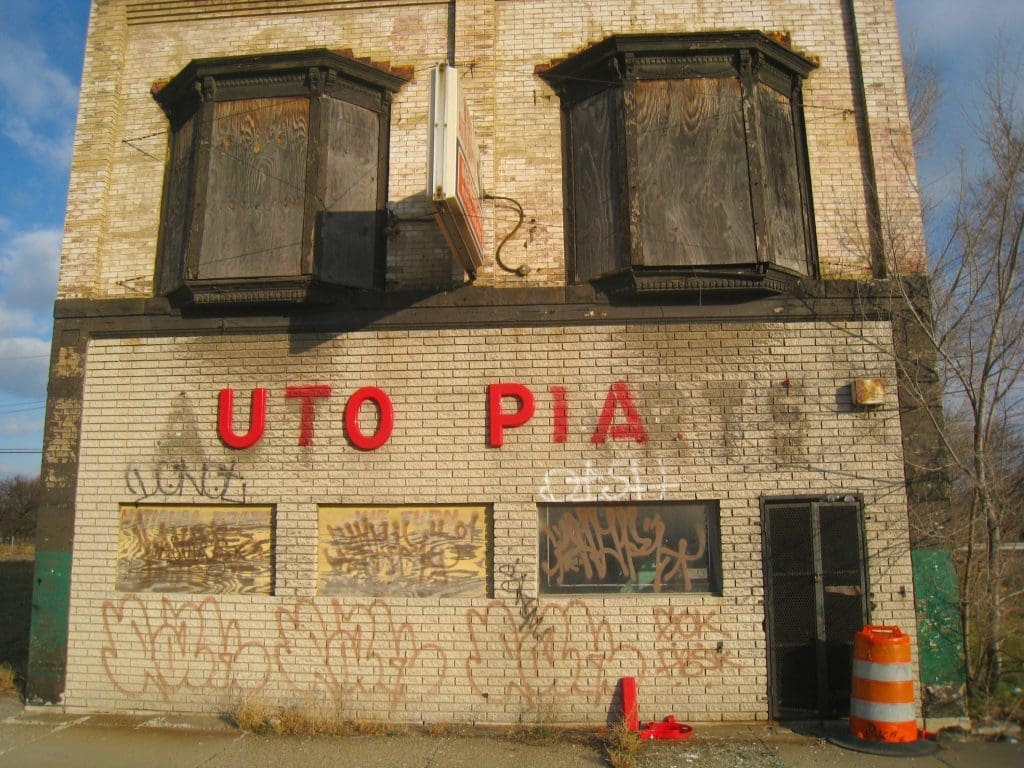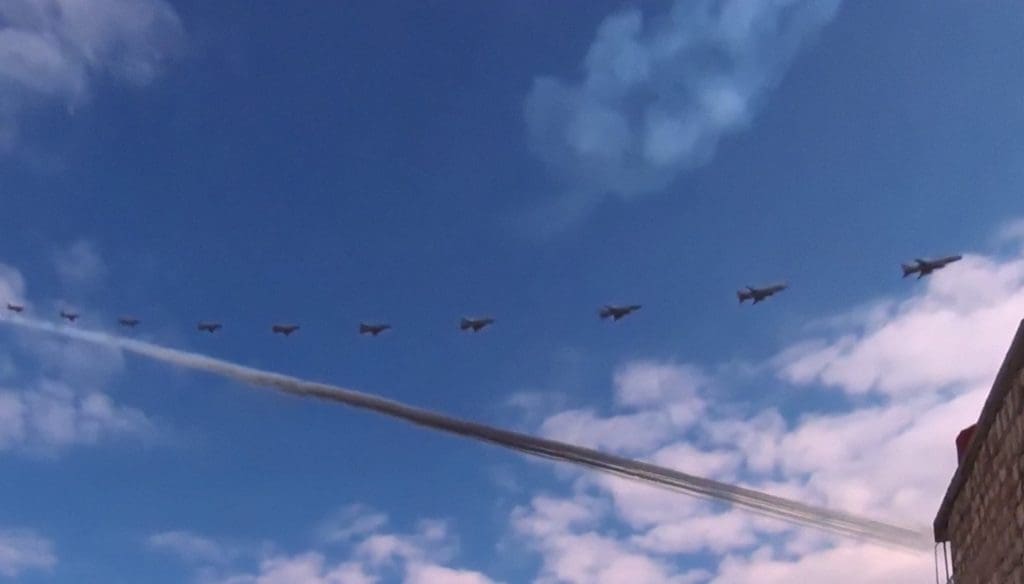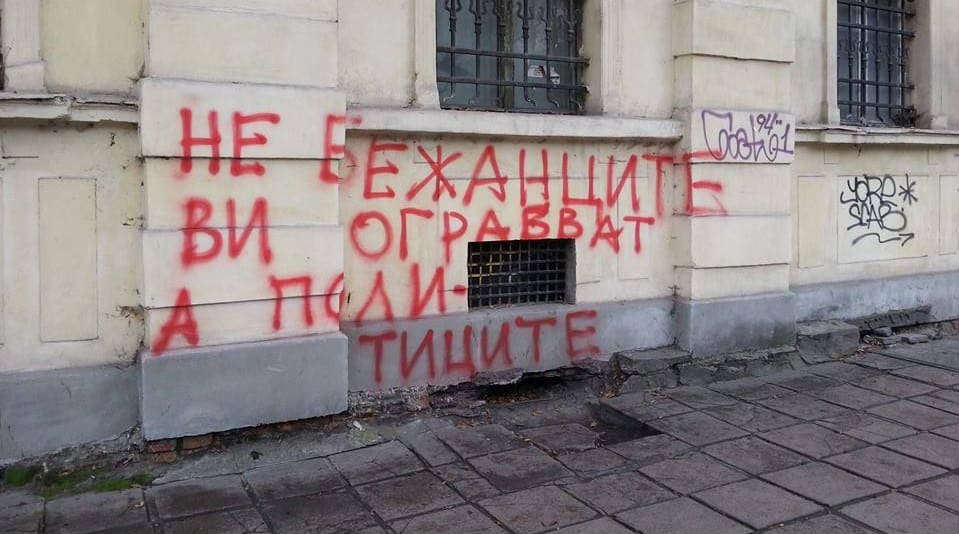Transcribed from episode #6 of the Politically Depressed podcast by Ayman Makarem and printed with permission. Edited for space and readability. Listen to the whole episode:
Palestinian solidarity groups here are majority migrants and people of color, and we didn’t feel comfortable letting all these other people speak on our behalf while saying, “We are antiracist.” Like, are you?
White People Cannot Stop Fascism (Alone)
by Ayman Makarem
28 January 2024
Keen listeners of this podcast will notice this is a special episode. I usually release episodes on Thursdays, and this is going to be the first time I release two episodes in one week. The reason is: I did something on Friday; I experienced something; I witnessed something—and I wanted to sit and record, and think things out loud, and express my feelings around it while it’s still fresh in my mind (and in my body).
I attended a protest here in Vienna. It certainly wasn’t my first protest. It wasn’t even my first protest in Vienna—I’ve been attending protests in solidarity with Palestine for the last three months. But this time was a bit different, because I wasn’t just another body; I wasn’t just another participant in a protest whose message I agree with and stand in full solidarity with. This was perhaps the first time I have attended a protest with the intention of staging an intervention.
I largely agreed with the message of this protest. But there were so many contradictions to it that I felt I had to—alongside a lot of other people—involve myself and have our voices and our specific demands heard.
What was this protest? First of all, a week ago there were massive protests across Germany against the far right. It was revealed in an investigation that the far right, alongside the AfD, the Alternative für Deutschland party, which is a far right party doing scarily well in the polls, were having secret meetings. In those meetings they drafted up plans for what they intend to do if they gain power, and one of those plans is mass deportation of migrants and refugees. It’s really scary shit. Rightfully so, people were outraged, and they went out into the streets in their droves.
At first glance it was quite cool and good. But once you look a bit closer, there are numerous issues and problematics that become very clear—and that were very clear for me. The protest I went to was the Austrian version of this. In many ways Austria is the “younger brother” of Germany. As a younger brother myself, I’m aware of how younger brothers can tend to want to imitate—my brother used to call me a “wannabe” growing up. And it’s true, I did want to listen to the same music as him, and I wanted validation from him. I don’t know if that’s the same dynamic between Austria and Germany, but regardless. There was a similar type of protest here which was vaguely against the right, “against hate.”
What I’ll do is share first my experience of participating in this, and participating in it the way that I did. Then I’ll follow with some of my analysis—the technical, political, historical aspects of it all. Ultimately it’s not that I learned anything new, but so many things were confirmed to me, and so many things were made concrete. Things that I’ve been thinking and saying for the last decade, and much more the last two years since I moved to this country and found myself surrounded by white people in the belly of the European imperial beast, so to say.
The first thing I’ll say is I’ve hesitated to talk at all about having participated in some of these protests, and I think that reflects one of the core differences between protests here and protests I’ve participated in in Lebanon: every protest here is registered with the police. I don’t just mean the routes and the times, but the chants and the slogans and the banners. There is very much this feeling that it’s not so much a contestation of the street or of public space, but that we are “allowed” to do this thing for this specific time, to air our grievances—but obviously that comes with limitations.
And people really abide by these regulations. I find myself doing it too, because here in Austria there really is this feeling of the panopticon; you kind of internalize the surveillance; you always feel like the state is watching you. So I already feel like I shouldn’t talk about these things, because I’ll be exposing myself. At the same time I know I haven’t done anything illegal, because I’ve fit within the registration laws at these protests. But even the fact that I’m thinking, Is this legal, is this not? is already showing the fact they’ve won: they’re inside my head. It’s not just being within these heavily surveiled and bureaucratized societies, but it’s also an experience of being an immigrant. I’m not on my turf. I feel very much that I am on their turf. I just wanted to preface with that.
I had heard about this protest last week. A lot of the groups that I’ve been participating in for these Palestinian solidarity protests were organizing to have a bloc, to participate in this protest but also to say, Hey, where were you all in our protests? If you care about racism, if you care about the right, then why aren’t you protesting with us against the Zionist genocide against our people back home? And the erasure of our voices and our demands and our attachments?
There’s this thing where if you are going out on the streets as an antiracist, then you are essentially speaking on behalf of racialized, marginalized communities. These Palestinian solidarity groups are majority migrants and people of color, and we didn’t feel comfortable letting all these other people speak on our behalf, and say, We are antiracist. It’s like, Are you?
I went to this protest, and for the very first time in my life, I made a banner. I took public transport; I got a lot of looks. I was also of course wearing my keffiyeh, which has become a thing. Maybe that’s a discussion for another time. But I was quite visible. When I get to the tram stop, I notice there’s quite a lot of people—hundreds and hundreds of people all walking—with a very specific hue. Very pale tones. That’s the experience of being Vienna, but regardless.
I realize that the meeting point for the Palestine solidarity bloc is on the other side. I have to pass through the whole protest. What I found was a bit disturbing, in a banal way. For a protest against fascism, against the lurching far right, there was some lo-fi club music, and people dancing a little bit, as though they’re waiting to get into a club. These are white people of all ages—again I emphasize this was a predominately white crowd. Why? Because once I crossed this crowd to the other side and meet up with the Palestinian solidarity people, it’s people of all shades, all races. It’s a layering dichotomy between the hegemonic and the counter-hegemonic, between the white majority and an actual diversity of identities. There was a queer bloc, an antifascist bloc, there were all these things. But specifically here it was Black and Brown people of all different shades and hues.
When I first got there, we were marching towards the main protest, but we were stopped by the police. They formed a barricade in front of us, blocking us from entering the actual space. I get super fucking triggered whenever I see any cops—this is definitely a Lebanon thing, or my stupid decisions, my experiences back home. But as we’re standing there and we’re doing our chants and the banners are being raised, these three or four assholes stand behind us and raise an Israeli flag.
It’s super fucking triggering seeing this flag live. The only other time I’ve seen it was ten years ago when I lived in London and went to some Palestinian solidarity march. There are always these assholes. The thing is, they’re trolls. They don’t have any demands, they just want to trigger you and try to elicit some reaction, and then they can cry victim. Which is the tactic of the Israeli state as well, which is crazy, but regardless.
We kind of ignore them, and we keep trying to get through to the other side. One white dude, a typical German—I’ve discovered that there’s such a thing as “Antideutsche,” usually a white German who is so anti-German and so self-hating that they become hardcore Zionists as a way of relieving that, and end up being incredibly racist and white supremacist, essentially. This guy walks through our crowd yelling, Free Gaza from Hamas! Free Gaza from Hamas! This is one of their new things. They love this chant. They think it’s genius. It’s disgusting.
But we’re all really trying to keep our cool. We’re chanting our chants, we’re focused, we’re not letting ourselves get distracted by these guys. But what ends up happening is that once we get a bit closer, these Zionist assholes run in front of us and create a cordon between us and the main protest—and then the cops reinforce and create these boundaries between us. If you came just at that moment, it looks like two sides. It looks like these loud Brown barbarians want to come in—it’s really disturbing when you think about it, because this is exactly the Israeli line. What did the president of Israel say the other day? That Israel is a bulwark, it is a barrier that prevents the Arab barbarian from coming to Europe. That’s what this looked like, and what they wanted to set up: essentially a thin line of Zionists preventing this horde of angry Brown people from entering the main thing.
I don’t know what to do in these situations. We stood there, and there are organizers talking to the cops, and the cops talking to whoever. A bit of background: there had been some discussions of allowing Palestine solidarity in the main protest, and even to be one of the speakers. But there was literal erasure and exclusion. I honestly started to get really nervous at this point, because there was a vibe. There was this guy who I know, who is an older librarian, he’s American, he’s Jewish, and he’s holding a banner that says Zionism is Fascism. He was nervous as fuck. And he got really harassed, really yelled at. I saw him break down crying because it was too much. It’s really difficult taking these stances.
There were lots of random people running left and right, and the cops were making maneuvers. There was a scary feeling that something is happening. I’ve felt this before, and I started to take a step back. These situations really push me to my boundaries. I really start to consider what I’m capable of doing—my instinct is to run away, but at the same time I feel like I need to take a stand. But I don’t feel like the most secure person in this country, and I don’t know. I start to feel it in my legs shaking: I’m really nervous.
That lasted about ten minutes, before some other organizers started coming up to us. I was with a friend who I had designated as my support person, and these two organizers, I think from Fridays for Future, came up to us asking, Are you guys okay? It was ridiculous. One of the people I was with said, If you care about our security and our safety, then first, why are the cops facing us? And second of all, if you want to make us safe, why are you allowing these people to carry this flag which represents a state which is enacting a genocide right now? It’s literally a hate symbol at this point!
It’s not, Oh, we want all voices! We want Arabs and racists and imperialists all talking! That’s not diversity. That’s not equality. That’s not a safe space.
And she said something which was so revealing. She said, Oh, well, some organizers wouldn’t even allow you to participate but we’re allowing you to be here. It was this hubris. Who the fuck do you think you are? To say you allow us to participate and be here? This is our right! It’s another one of those examples where white people cannot just sit down and listen to what we’re saying. They genuinely think that they know what to do, and they know how to fix these things and create these spaces and how to heal the wounds that in most cases they themselves, and their states and armies, have created.
I’m getting a bit worked up. I’m going to scale it back.
At a certain point there were some discussions, and the police opened up and allowed us to enter the main thing—though we weren’t allowed to hold our banners or chant. I think everyone knew what that meant. They allowed us in and we just kept chanting anyway. At one point we heard someone take to the stage and yell something about how shameful it is that at an antiracist protest there is a clear section where mostly Black and Brown people are being kettled and kept in a corner. It’s shameful and it’s contradictory and it’s hypocritical.
Honestly I never got a sense of the space because we were kept outside of it. Once we were able to go in, I could see that there were quite a lot of people. But there was very much a division between the “main” protest and us—us who were chanting for a free Palestine, for an end to genocide, for an end to colonialism, who were saying that Zionism is a form of racism and you cannot be an antiracist and a Zionist. It is just a contradiction in terms.
Here I’ll start to get into the actual analysis. What we were also pointing out was that in our sheer presence, and in our insistence on being present, and their insistence on excluding us, they betray the very structural racism that exists and permeates the society right now. Not because of the far right, not because of something that is going to happen, but what exists right now.
I can think of so many examples, so many ways of illustrating this point. Austria is one of two European countries that voted against a ceasefire at the UN. There was a poll released a few months ago about racism in Europe; there was a huge long term study of Black people in Europe, and they found that not only is racism rampant in Europe, but the two worst countries for Black people in terms of experience and daily exposure to racism are Germany and Austria. And the German chancellor is a staunch Zionist, talking about deportation—the way they talk about Brown people in Germany is horrendous and racist. And white people don’t seem to see that as problematic.
I saw a picture today that summed up most of my thinking. It’s a little cartoon with two pictures. In one there is a wolf in a house with a broken roof, and it’s raining. In the second picture, it’s sunny and the wolf is poking his head outside the roof. It reads: Haggis has a hole in his roof. He never fixed it because on rainy days it was too wet to work, and on sunny days it doesn’t need fixing. This perfectly sums up why fascism is on the rise, and why it’s super terrifying to see white liberal people thinking they have things under control when they just don’t.
My experience yesterday was going to this protest and thinking, You people are unserious. You are not actually prepared to fight fascism. It’s not going to be a party. And you are only showing up now. There aren’t protests that often here, and if there are, aside from the Palestine protests, it’s weird rightwing nutjobs protesting and organizing around COVID conspiracy bullshit. And yet there was this feeling at this protest that was like, We’ve done our part! We went to this thing! I don’t think they’re going to continue organizing. But they’ll definitely feel good about themselves, that they’ve actually done something—when they haven’t.
Actually resisting fascism takes organizing, it takes commitment. It’s laborious. It’s scary, it’s risky. And I believe everyone can do it. But the contradictions were so apparent at this protest of white people talking to themselves. I should mention, there was some dickhead on stage who noticed our flags and said, Go home kids, that has nothing to do with what we’re dealing with. It’s ridiculous. The hubris! That they know fascism better than us! That they know racism better than us! And they not only know how to see it but they know what to do about it…
Honestly, this experience yesterday was a vivid elaboration and expression of my fears and worries: that there are no adults in the room. That there is this lurch to the right, and the center has moved to the right—but also that the right is organizing, and is serious, and is taking power, and the masses of people are doing nothing. They are complacent; they’re fine. Again, I’m talking specifically about white people. Because within this power structure of white supremacy, white people are fine for now. But that bubble is getting smaller and smaller, and if they don’t listen to Black and Brown people, fascism is going to come through the door or through the window and there’s not a damn thing they can do about it, because they’ve already thrown anybody who can stop it or see it, or knows the forms that it’s taking, completely under the bus.
It’s this thing of, First they came for X and I did nothing because I’m not X. If white people are really serious about tackling fascism, they need to start listening to Black and Brown people, to racialized people. They need to understand their positionality within white supremacy that makes it so there is stuff they don’t see. There is stuff about themselves they don’t see. There is stuff in society that they don’t see, that they don’t think is a problem, that if they were actually to listen to an immigrant, to a refugee, would be much more clear.
People upstream smell the shit much quicker. I like this metaphor. We smell the shit much sooner, before it hits them. But once it hits them, it’s already too late. It’s something I was really afraid of with this protest. Them coming out now—I’m not a cynic. I’m not saying it’s too late. But it is late. Late for them to be seeing this thing that people like me and other Arabs and Muslims have been saying for decades.
There’s so much to think about and talk about. But that protest exemplified so many things in terms of white supremacy—not of the fringe, but of the majority, of most white people. The white supremacy they’ve been born into, the world we live in, something that permeates our economies and ecology and everything. Being born a white person in this white supremacist world that white people have created—to recognize that and to know what the tools are to dismantle that, you have to listen to Black and Brown people. If you don’t, then you are replicating the thing that you claim to want to destroy and dismantle: white supremacy.
I wanted to share this experience, because it was a lot. I’m definitely going to be thinking about it, and it confirms so much. I hope you liked this episode of Politically Depressed.
Featured image source: Flickr

